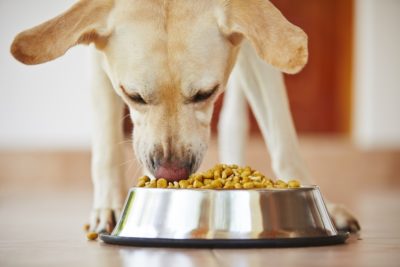The Benefits of a Balanced Microbiome

The term “gut microbiome” is often used to refer to all the organisms—including bacteria, viruses, and fungi—that live in an animal’s gastrointestinal (GI) tract. For people and pets, these organisms have a large impact on the health of both the GI tract and the entire body.
Dr. Audrey Cook, an associate professor at the Texas A&M College of Veterinary Medicine & Biomedical Sciences, discusses the importance of a dog’s gut microbiome and the consequences if it were to become altered or imbalanced.
“The sheer number of organisms in a healthy gut is tremendous; any one of us has more organisms living in our GI tract than there are people on the face of the earth,” Cook said. “Although we used to think that those bacteria were just along for the ride, we now know that they play a key role in maintaining health.”
Scientists have yet to discover the gut microbiome’s full impact, but they do know that it plays a large role in a dog’s overall health and well-being, impacting GI tract function, nutrient absorption, immune status, body condition, and many important hormonal responses.
Cook compared a healthy microbiome to an ecosystem, such as a coral reef or rainforest, where organisms work both independently and in relationship with each other.
Unfortunately, many things can disrupt this complex system of microorganisms, creating a condition called dysbiosis.
“These disruptors include many medications, particularly antibiotics; infection with GI tract pathogens; changes in diet; anesthesia; stress; and starvation,” Cook said. “It can take a long time for the microbiome to return to normal after an upset.”
Though the full impact of dysbiosis is still unknown, Cook said there are a variety of symptoms that can occur because of the condition.
“Dysbiosis can result in weight loss, bloating, flatulence, poor appetite, and changes in stool consistency, such as diarrhea,” she said. “Some research in other species suggests that an abnormal microbiome may also contribute to numerous non-GI disorders, including obesity, mental illness, and type 2 diabetes.”
To avoid the effects of an unbalanced microbiome, Cook says there are several ways to foster a healthy community of gut microorganisms in a dog.
First, she recommends avoiding the unnecessary use of antibiotics, because even a short course of antibiotics can have a big impact on the gut microbiome. Antibiotics are prescribed to kill bad bacteria that cause illness or infection, but they also kill good gut bacteria in the process.
“Feeding a consistent, high-quality diet is also helpful, and we certainly want to avoid introducing pathogens such as Salmonella by feeding raw foods,” Cook said.
Probiotics are live, good microorganisms found in some foods and supplements that can contribute to a healthy gut microbiome. Many veterinary products claim to contain probiotics, but dog owners should consult with a veterinarian before choosing one of these options, as some are poorly researched.
Similarly, some dog foods contain prebiotics, such as soluble fibers that feed good bacteria, but there is only limited evidence of these foods effectively improving the health of the gut microbiome.
While feeding your dog and giving medications, pay attention to the effect they may be having on the gut microbiome. Though an altered microbiome can have negative consequences, a GI tract full of good microorganisms can be the key to a healthy dog.
Pet Talk is a service of the College of Veterinary Medicine & Biomedical Sciences, Texas A&M University. Stories can be viewed on the web at vetmed.tamu.edu/news/pet-talk. Suggestions for future topics may be directed to editor@cvm.tamu.edu.


